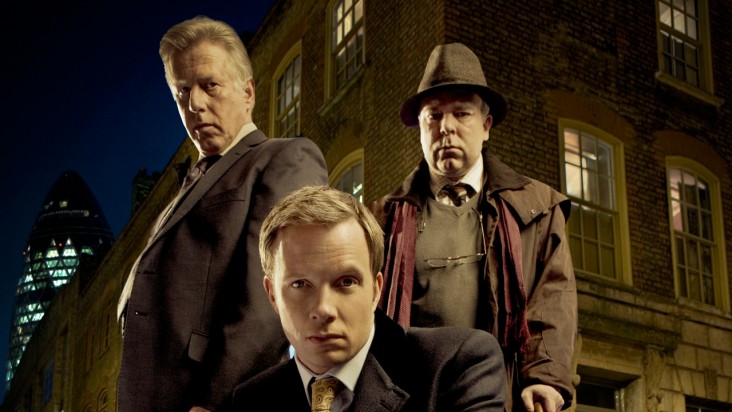Moving Pictures: Blood and gore of Whitechapel; What more could you ask for?
Are you a yet another sleepwalking PBS Anglophile who imagines that British Television only produces Masterpiece Theater period pieces that really are “masterpieces”?
We can cure your sad condition by immediate exposure to the current series of Whitechapel on Wednesday nights on BBC America.
Whitechapel was a huge hit on British TV and has done equally well on cable over here. There is nothing original or groundbreaking about the series at all: It is extremely gory, especially in its depiction of severed body parts in the CSI and NCIS franchises style. But what is really interesting is how it owes its success to the simple unsophisticated guilty pleasures of British and American TV audiences alike for “’orrible murders, read all abaht it” sensationalism. Yet at the same time it serves the same audience’s snobbish craving for pseudo-sophistication and class, Downton Abbey style.
How to reconcile these apparently clashing, indeed schizophrenic cravings?
Simple.
BBC (the Beeb to the Brits it smother-loves with its pandering fare) has cannily cast a classic clean-cut upper-class British hero, Rupert Penry-Jones, as the heroic detective inspector (DI) sleuthing the awful crimes in the grimy Victorian shadows of London’s East End. Penry-Jones looks as if he ought to go “over the top” to die heroically on the Western Front in any episode of Downton Abbey, or Speilberg’s schmaltziest-ever extravaganza War Horse (diabetes sufferers, never ever see that movie – It’s so sickly-sweet and manipulative it will propel your sugar-count into the 400s).
And indeed, Penry-Jones was superb in the latest TV version of John Buchan’s Thirty Nine Steps which is nothing more or less than a lament for the lost leisured world of pre-1914 English imperial style and elegance (though hardly of innocence).
The second inspired casting-decision that Whitechapel’s creators made was to team up Penry-Jones with his polar opposite: Phil Davis has one of the most commanding voices and presences in British drama – but he is little more than 5 feet tall. He is also quite old (by TV stud standards), not at all handsome and irredeemably working class. In the first series of Whitechapel, his Detective Sergeant (DS) Ray Miles and Penry-Jones’ DI Joseph Chandler hunted a modern incarnation of Jack the Ripper.
At first they hated each other’s guts before finally coming to a genuine but also bemused (on both sides) respect and eventually even friendship for each other. It is the old British aristocratic class myth of worthy, heroic sons of earls and grimy, abusive but ultimately lovable toiling trolls coming together for the good of all at the end of the day. If Penry-Jones is a grown up Harry Potter, Davis plays his loyal and ever-grumbling Kreacher.
Whitechapel also mines the even deeper vein of Victorian horror made manifest by the still unsolved five Ripper murders of 1888. For more than 130 years, Anglo-American audiences have continued to show an unquenchable lust for it.
There is nothing courageous or even real about the world Whitechapel presents. Like East Enders, scattered over the afternoon PBS schedules across America’s Heartland, it presents a dream version not of the way the British want the Americans to see them but the way they see themselves. It certainly has almost nothing to do with the ghastly depressing, endless sociological squalor of London’s real East End today, or even of 40 years ago where, as I well remember, nothing ever worked and you couldn’t even have the simple pleasure of smashing up a public telephone box because they’d all been vandalized already.
The police heroes in Whitechapel are all clean cut and none of them are violent, abusive alcoholics. London society is portrayed as squalid in the show, but also always as essentially warm and never soulless –a whopper of a lie if ever there was one.
One gets a far better sense of London life, crime and punishment in a far better series produced interestingly by Independent Television but broadcast in the U.S. by the BBC, the British adaption of Dick Wolf’s Law and Order.
But after all, the Magic Mirror of popular TV was never about accurately reflecting reality or responsibly informing its audience about the so-called Real World. Whether your thing is Gary Sinise jutting his jaw on CSI:NY or the wonderful Gillian Anderson gleefully hamming it up in Great Expectaitons, Whitechapel will definitely be your cup of tea – with a generous drop of gin thrown in.

Martin Sieff is an editor at Sputnik, the Russian-owned news organization. He is the author of The Politically Incorrect Guide to the Middle East (2008), Gathering Storm (2014) and Cycles of Change: The Three Great Eras of American History and the Coming Crisis that will Lead to the Fourth (2014). Follow Martin on: @MartinSieff

